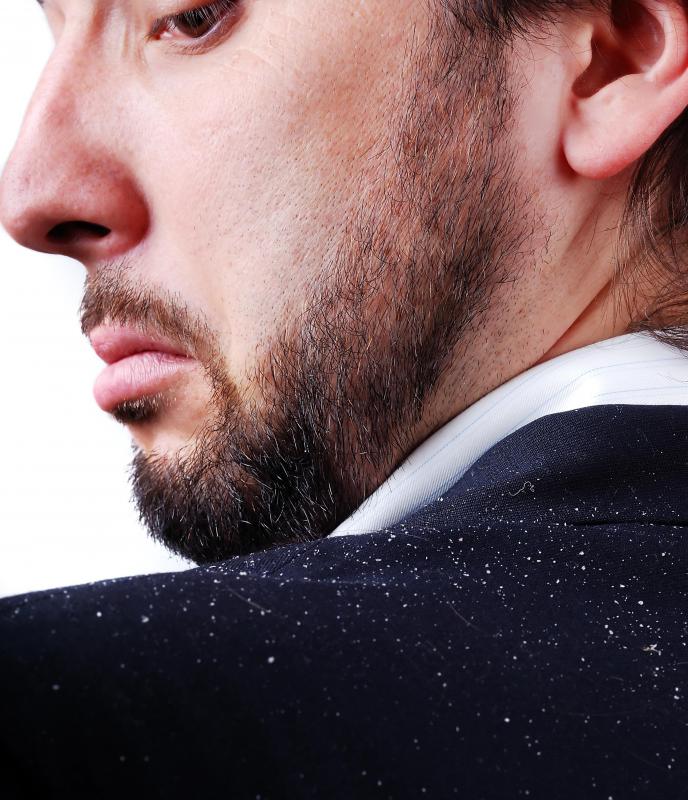At WiseGEEK, we're committed to delivering accurate, trustworthy information. Our expert-authored content is rigorously fact-checked and sourced from credible authorities. Discover how we uphold the highest standards in providing you with reliable knowledge.
What are the Different Types of Scalp Ointment?
Different types of scalp ointment are made for various conditions of the scalp. Some common scalp ailments that may need to be treated with an ointment are psoriasis, eczema, and seborrhoeic dermatitis. The treatments will help to cure some of their undesirable side effects, like dryness, dandruff, scaly skin, and more. Other varieties of scalp ointment exist for the purpose of maintaining a healthy scalp and head of hair. Scalp ointments can be oil- or cream-based, and some of the most scalp ointment common ingredients include salicylic acid, calcipotriol, and hydrocortisone, as well as other types of food-based ingredients.
Any problem with the scalp will be best diagnosed by a dermatologist, who can also recommend or prescribe the best treatment. Usually, scalp ointments are applied to the problem area for a prescribed amount of time, and then rinsed off. Some others are meant to be left in until the next time the hair is washed.

Left untreated, problems with the scalp will typically either stay the same, or worsen. Common symptoms of scalp ailments are dryness and dandruff. These symptoms can be caused by a variety of problems, including eczema, seborrhoeic dermatitis, and psoriasis. A dermatologist is the best option for a person who needs to pinpoint a particular scalp problem.

Many conditions can be treated by the same type of scalp ointment. Salicylic acid is found in many scalp ointments and can also be found in many shampoos that are designed for scalp treatment. This common agent will cause skin cells to shed, open up clogged pores, and stop bacterial growth. Salicylic acid comes in many different varieties of ointments, and can be found in both prescription and over-the-counter drugs.

Scalp ointments may also be available as creams. Calcipotriol and hydrocortisone are two active drugs that might be found in a cream-type scalp ointment. Calcipotriol is a derivative of vitamin D, and is known to be effective in treating psoriasis of the scalp. Hydrocortisone is a topical steroid that helps to reduce problems by limiting the body's reaction to them. Cream treatments can be preferred over others because they can be less oily, as well as simpler to apply and maintain.

Other scalp ointments are designed to keep the scalp healthy by containing ingredients that help skin as well as hair follicles. These can contain many different ingredients, often including different types of food ingredients. For example, these types of scalp ointments may contain extracts from olives, avocados, carrots, oranges, and more. Many scalp ointments like these are marketed as organic.

Additional scalp treatments are designed to promote hair growth. The success of these products is typically limited, and may vary from one scalp ointment to another. Their ability to work can also depend on the individual who is using them. Ironically, use of these products can even have side effects of other scalp-related problems, such as dandruff.
AS FEATURED ON:
AS FEATURED ON:















Discussion Comments
@serenesurface-- What type of scalp condition do you have? There are actually many different types of ointments you could try such as sulphur ointment, tar ointment, salicylic acid ointment, vitamin D ointment, tea tree oil ointment, anti-fungal ointment etc. But some work better than others for certain conditions. For example, if your scales and itching is due to a fungal infection, then tea tree oil or anti-fungal ointments will work best. If you have dermatitis or psoriasis, then you can try vitamin D ointment or sulphur ointment.
You need to see your doctor and ask for a recommendation. A doctor needs to diagnose your scalp condition. Using the wrong treatments will make your condition worse.
@serenesurface-- Have you tried a tar ointment?
My dad has psoriasis which also affects his scalp. He tried many different treatments and remedies, none of them worked. Then, a family friend who is a doctor suggested tar ointment. This ointment is working great for him. It soothes skin, gets rid of scales, dandruff and itching. It's not just effective for psoriasis but for different types of dermatitis as well. I think it's definitely worth a try.
What is the best natural scalp ointment for scales and itching?
I tried a scalp ointment with hydrocortisone and it did work but my symptoms return as soon as I stop using it. And my doctor said that I should not use steroid ointments continuously as it will cause more problems in the long term. I need a safer and more natural alternative that is effective and that I can use on a regular basis. Any recommendations?
Post your comments